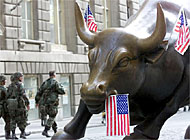US attacks could undermine many Swiss companies

The economic effects of last week's terrorist attacks on the most potent symbols of American economic and military power may be felt far beyond the borders of the United States. The global economy was already fragile; many Swiss companies now regard the future with even more uncertainty.
The United States is Switzerland’s second biggest export market, worth more than SFr17.4 billion ($10.9 billion) per year. Pharmaceutical companies like Novartis and Roche depend on the US for up to 40 per cent of their annual sales revenue. In Switzerland, 70,000 people work for American companies.
“If we look at the Swiss economy, it’s highly dependent on international relations, and a negative turn for the US will clearly have negative consequences for Swiss companies,” says Stephan Meier of Business Network Switzerland. “The banking and finance sector will have to pay for the damage somehow, classical exporters such as watchmakers and the heavy machinery sector will be hit, not to mention the airline industry.”
Stock markets tumbled, thousands of commercial airliners were grounded and financial institutions haven’t begun to count the cost of the cleanup operation. Tuesday’s attacks brought chaos to the West’s financial and economic systems and many fear they could tip the US and the rest of the world into recession. Switzerland would be affected along with the rest of the industrialised world.
Stock response crucial
Much will depend on the reaction of global stock exchanges, currency markets and last but not least, on the psychological impact on the business world, Meier says. He fears that new investment could dry up if pessimism takes hold.
So far, the signs are not good. European and Asian stock markets have fallen sharply in the last week. The Swiss franc, in line with its safe haven image, has risen sharply in value against the dollar and other major currencies, making Swiss exports more expensive.
It may be too soon to tell if the attackers have been able seriously to destabilise the world economy or whether they’ve just administered a temporary shock. The New York stock exchange closed after the attacks and economists will be studying how it performs this week.
For many companies, however, it’s already clear that last Tuesday’s events will hurt their performance. Swissair’s shares have fallen to an all-time low on the assumption that fuel prices will increase and that demand for travel may decline.
Tourism could be hurt
The tourism industry is also likely to fall victim to the rise in international tension.
“We’ve had of course a lot of cancellations and we’ve allowed clients travelling up to the end of September to cancel free of charge,” says Kuoni spokeswoman, Regula Weyermann.
Weyermann says around 1500 people have cancelled trips to the US, and traffic in the opposite direction will also be affected. But she adds that the financial impact on the country’s biggest tour operator may at least be offset because it’s now low season.
The expected decline in consumer confidence is also hitting luxury goods firms such as Richemont that are heavily dependent on the US market. Even if the US response is limited, analysts fear that consumer sentiment is unlikely to recover for six months.
Watching fuel prices
The level of fuel prices is likely to have a major impact on whether the industrialised world weathers the storm or sinks into recession.
In the immediate aftermath of the attacks, the price of crude rose from $28 to $30 a barrel. The price fell back over the next two days, as it seemed clear that no oil producing state had been involved and because OPEC promised to maintain or increase production to keep prices stable.
But on Friday, the oil price rose again as US officials began to point the finger at Iraq prompting fears that oil producers could be dragged into a wider conflict.
“In future weeks and months, we’ll be confronted with extreme volatility in oil prices and consumers will have to expect increased anxiety and speculation in the market,” says Ralph Hartl of the Swiss Oil Association.
No one is certain how far the attacks on New York and Washington and the reprisals to come will affect the global economy. Central banks have promised concerted action to keep currency markets stable and the US Federal Reserve and the Swiss National Bank have already cut their interest rates to boost confidence.
Private banks have been lending rivals money to ensure liquidity is maintained and many companies have announced share buyback plans to prevent their share price falling.
But economics is an uncertain science at the best of times and will be even more unpredictable in the weeks to come.
by Michael Hollingdale

In compliance with the JTI standards
More: SWI swissinfo.ch certified by the Journalism Trust Initiative
You can find an overview of ongoing debates with our journalists here. Please join us!
If you want to start a conversation about a topic raised in this article or want to report factual errors, email us at english@swissinfo.ch.